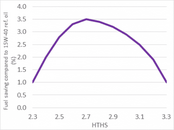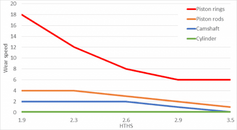Shell che ho messo io e più viscoso del selenia, e un C2 al massimo superiore,(3'5) forse per questo sulla mia auto fa consumare parecchio in piu.
passare da un w20 ad un w40 aumenta i consumi del 5% circa
quindi è assurdo pensare che sia solo per via della viscosità che un 0w30 aumenti del 10% rispetto ad un altro 0w30
e poi cosa centra il C2?
il wr forward è C2, shell helix ultra ect è c2/c3
i parametri in cui si differenzia C2 e C3 sono:
C2
-viscosità HTST maggiore/uguale a 2.9
-TBN (quantità di additivo basico atto a contrastare l' azione acidificante del carburante) n/d ossia valore non previsto in quanto additivo assente
C3
-HTST maggiore uguale a 3.5
-TBN maggiore uguale a 6.0
HTST e consumi:

però su olio 15w40 non 0w30 che chiaramente è più fluido
HTST e protezione motore:

"
In summary, it
cannot be said whether a
high or low HTHS value is better. This answer can only be given if, for example, the specified HTHS limit values (by standards such as ACEA, API, etc.) and the temperatures and shear forces occurring are taken into account.
In simple terms, if a car drives more short distances in urban traffic, lower temperatures and shear forces occur, a lower HTHS value would be advantageous.A fast driven car during long distances would, on the other hand, benefit from a higher HTHS value."



